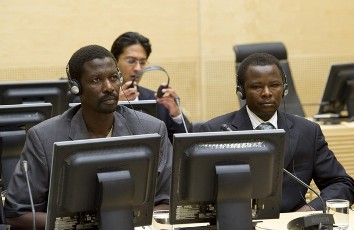ICC converts Darfur rebel figure’s court summons to arrest warrant
September 11, 2014 (KHARTOUM) – The judges at the International Criminal Court (ICC) decided on Thursday to issue an arrest warrant for a Darfur rebel commander after asserting that there are no guarantees that he will be able to appear voluntarily for his trial set for next November.

He allegedly commanded a 1,000-strong rebel force in the September 2007 attack, on the African Mission in Sudan (AMIS) base in Haskanita in North Darfur. They looted the camp of 17 vehicles, refrigerators, computers, mobile phones, ammunition and money.
Twelve African Union peacekeepers were killed and eight others severely injured. The victims came mainly from Nigeria, Senegal, Mali and Botswana. It was the deadliest single attack on the peacekeepers since they began their mission in late 2004.
Banda was a senior military commander in Darfur’s rebel Justice and Equality Movement (JEM) before he was dismissed during a bitter split among the movement’s governing elite in mid-2007. He went on to form a rival faction, the JEM Collective Leadership, with former JEM Vice President Bahar Idriss Abu Garda.
Abu Garda appeared voluntarily before the ICC as did his two peers to answer charges relating to the same attack but the court declined to pursue those charges citing insufficient evidence to prove his criminal responsibility.
The other rebel commander who faced the same charges, Saleh Mohammed Jerbo Jamus, was killed last year during clashes with fighters from the Justice and Equality Movement (JEM) led by Gibril Ibrahim.
Banda and Jerbo have not denied their role but contended that the AMIS base was a legitimate military target and as such the trial will be dedicated to arguing this issue before the judges.
Even though the confirmation of charges hearing was concluded quickly in March 2011 the trial faced hurdles as the ICC registry had trouble recruiting and training interpreters who spoke the Zaghawa language, which is spoken by the defendants.
Furthermore, the defense filed motions seeking to have the judges compel Khartoum to allow it to carry investigations in Darfur.
POSSIBILITY OF ATTENDING TRIAL
The majority stated in its decision today that there were new circumstances that warranted a review of the existing summons.
“As indicated in its 14 July decision by Majority, the Chamber is neither in a position to effectively prevent or mitigate the risks associated with particular circumstances of the case nor is it able to find an appropriate solution to problems derived from such risks,” the decision reads.
“For that reason, the Chamber pursued the cooperation of Sudan and requested its government to facilitate Mr. Banda’s presence at the trial. This cooperation, according to the information provided by the Registry, is not forthcoming. The Chamber will determine in due course the appropriate course of action in order to ensure compliance with the request of the Court”.
The judges further said that “regardless of whether Mr. Banda wishes or not to be present at trial, there are no guarantees that in the current circumstances, he will be in an objective position to appear voluntarily. For these same reasons, the Chamber does not consider it appropriate to request an undertaking from the accused”.
They noted that summonses are intended “for individuals that are not only personally willing to appear on a voluntary basis but are also in a position to do so”.
As such the chamber decided to vacate the trial date of next November and suspend preparatory measures for the trial until his arrest or voluntary appearance.
It promised however, that should he appear voluntarily, it may “revisit accordingly the conditions of his stay in The Netherlands during trial”.
It is not clear what specific issues emerged made judges skeptical that Banda could show up voluntarily at his trial but the decision did not appear to imply his unwillingness to appear.
The ICC is investigating both sides of the Darfur conflict. Four others remain wanted for war crimes in Darfur: Sudanese Defense Minister Abdel-Rahim Mohamed Hussein, North Kordofan governor Ahmad Haroun, pro-government Janjaweed militia leader Ali Kushayb and Sudan’s President Omer Hassan al-Bashir, whom prosecutors accuse of genocide, crimes against humanity and war crimes in Darfur.
Sudan refuses to recognise the jurisdiction of the court calling it a neo-colonial plot aimed at overthrowing the regime.
The United Nations Security Council (UNSC) adopted resolution 1593 in March 2005 which referred the situation in Darfur to the ICC for investigations.
(ST)
